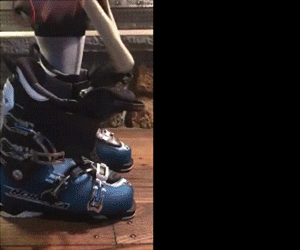Long post ... key stuff is in bold.
I tore my ACL skiing last season and fractured the proximal tibia. Mystupidity injury occurred on Monday. An MRI was done on Friday. In the MRI, the attachment of the ACL to the bone looked grayish and "fuzzy". I gather that if it's fully intact, it will show up as a distinct line; "indistinct" says yes, it's there but it's messed up. The extent of "messed up": Unknown. The MRI is where they first saw the fracture; normal X-rays didn't show it. The doctor (sports medicine ortho) explained the injury like this -- the ACL overextended, allowing the femur to crash down onto the tibia, fracturing the proximal tibia.
Questions I asked over the course of this:
Q: Will you order another MRI after the 6 weeks of non-weightbearing to verify the bone has healed?
A: No, bones heal in 6 weeks so there is no need to look at it again. With respect to everything else, an MRI will look much the same at that point. The dark areas of fluid will still be there. It takes the body as much as 6 months to absorb all of the fluid.
Q: Will I need the ACL replaced?
A: I don't know. You don't know. Your knee will tell us. If you can do all of your normal activities with no problem, then no, you don't need surgery. If your knee "gives" and causes you to fall, then yes, you will need surgery.
Q: Can I ski this season?
A: No. Due to the fracture, ski season is over. (It was December.) Had it been only the ACL, then yes, you could ski again this season - just not right away. You will need to wear a brace for skiing - and ONLY for skiing. Prior to the damage, your ACL demonstrated the ability to overextend (hence, the fracture). With less ACL, it may be more prone to overextending again.
According to my doctor, it comes down to how your knee functions for you and your normal life.
If you want surgery, a doctor will do it. If you are interested in avoiding surgery but concerned about being able to continue the more intense activities that you have been doing, you might ask whether there are braces that will provide the support you need for those activities ... assuming your knee is stable for normal daily living. If you prefer to avoid surgery and the doctor is pretty sure you will regret that decision, I expect s/he will tell you so.
I tore my ACL skiing last season and fractured the proximal tibia. My
Questions I asked over the course of this:
Q: Will you order another MRI after the 6 weeks of non-weightbearing to verify the bone has healed?
A: No, bones heal in 6 weeks so there is no need to look at it again. With respect to everything else, an MRI will look much the same at that point. The dark areas of fluid will still be there. It takes the body as much as 6 months to absorb all of the fluid.
Q: Will I need the ACL replaced?
A: I don't know. You don't know. Your knee will tell us. If you can do all of your normal activities with no problem, then no, you don't need surgery. If your knee "gives" and causes you to fall, then yes, you will need surgery.
Q: Can I ski this season?
A: No. Due to the fracture, ski season is over. (It was December.) Had it been only the ACL, then yes, you could ski again this season - just not right away. You will need to wear a brace for skiing - and ONLY for skiing. Prior to the damage, your ACL demonstrated the ability to overextend (hence, the fracture). With less ACL, it may be more prone to overextending again.
According to my doctor, it comes down to how your knee functions for you and your normal life.
If you want surgery, a doctor will do it. If you are interested in avoiding surgery but concerned about being able to continue the more intense activities that you have been doing, you might ask whether there are braces that will provide the support you need for those activities ... assuming your knee is stable for normal daily living. If you prefer to avoid surgery and the doctor is pretty sure you will regret that decision, I expect s/he will tell you so.

 .) He is technically "permanently lame" but don't tell him that! Between Pentosan polysulfate, adequan, and shockwave treatments, he is doing very well and has won two national titles and multiple regional titles with me since his diagnosis :D (He just finished a series of three shockwave treatments today, preparing for show season.) He has also had several IRAP injections, however, they seemed to have minimal effect.
.) He is technically "permanently lame" but don't tell him that! Between Pentosan polysulfate, adequan, and shockwave treatments, he is doing very well and has won two national titles and multiple regional titles with me since his diagnosis :D (He just finished a series of three shockwave treatments today, preparing for show season.) He has also had several IRAP injections, however, they seemed to have minimal effect.